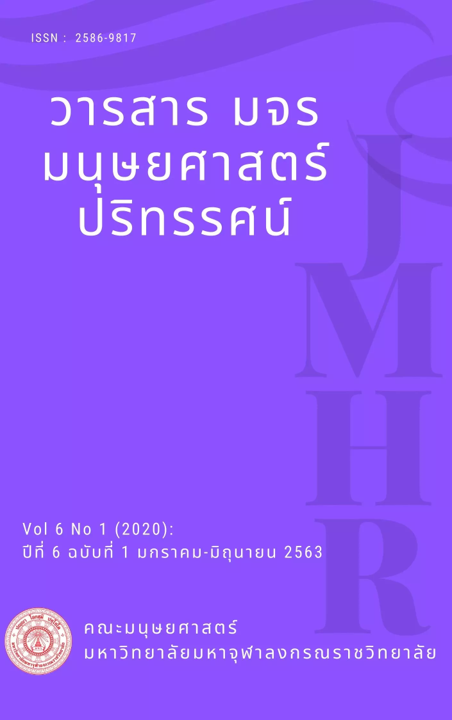การวิจัยชาติพันธุ์วรรณนาอภิมานเกี่ยวกับการปรึกษาแนวพุทธจิตวิทยา
คำสำคัญ:
การปรึกษาแนวพุทธจิตวิทยา, การวิจัยชาติพันธุ์วรรณนาอภิมาน, รูปแบบการปรึกษาแนวพุทธจิตวิทยาบทคัดย่อ
บทความนี้มีวัตถุประสงค์ 1) เพื่อวิเคราะห์คุณลักษณะงานวิจัยที่ศึกษาเกี่ยวกับการปรึกษาแนวพุทธจิตวิทยา 2) เพื่อสังเคราะห์ให้ได้สภาพปัจจุบันของความรู้เกี่ยวกับการปรึกษาแนวพุทธจิตวิทยา 3) เพื่อเปรียบเทียบความเหมือนหรือความแตกต่างของผลการวิจัยที่ได้จากการศึกษาเกี่ยวกับการปรึกษาแนวพุทธจิตวิทยา และ 4) เพื่อนำเสนอผลการสังเคราะห์รูปแบบการปรึกษาแนวพุทธจิตวิทยาด้วยการวิจัยชาติพันธุ์วรรณนาอภิมาน รูปแบบการวิจัยเป็นงานวิจัยเชิงคุณภาพ เก็บข้อมูลจากงานวิจัย จำนวน 11 เรื่อง ในช่วงปี พ.ศ. 2552-2559 โดยใช้วิธีวิทยาการวิจัยแบบ “การวิจัยชาติพันธุ์วรรณนาอภิมาน” ด้วยการสังเคราะห์ข้อมูลโดยวิธีการแปลความเทียบกลับไปกลับมา การแปลความเชิงหักล้าง และการแปลความเพื่อเสนอประเด็นการโต้แย้ง โดยพบผลการวิจัยว่า 1) งานวิจัยที่นำมาสังเคราะห์ส่วนใหญ่เป็นวิทยานิพนธ์ระดับปริญญาเอก โดยศึกษาในประเด็นวิจัยเกี่ยวกับกระบวนการปรึกษาแนวพุทธจิตวิทยาและรูปแบบการปรึกษาแนวพุทธจิตวิทยามากที่สุด 2) ผลการสังเคราะห์สภาพปัจจุบันของการปรึกษาแนวพุทธจิตวิทยา พบว่ามีเป้าหมายการปรึกษา 6 เป้าหมาย หลักธรรมที่เกี่ยวข้องกับการปรึกษา 26 หลักธรรม คุณลักษณะของผู้ให้การปรึกษา 6 คุณลักษณะ กระบวนการปรึกษา 6 ขั้นตอน ทักษะที่ใช้ในการปรึกษา 14 ทักษะ และผลของการปรึกษา 6 ประเด็น 3) ผลการสังเคราะห์การแปลความเทียบกลับไปกลับมา พบว่า มีประเด็นอุปมาที่สอดคล้องกัน คือ เป้าหมายการปรึกษา 2 เป้าหมาย คุณลักษณะผู้ให้การปรึกษา 5 คุณลักษณะ กระบวนการปรึกษา 5 ขั้นตอน ทักษะที่ใช้ในการปรึกษา 6 ทักษะ ผลของการปรึกษา 5 ประเด็น และผลการสังเคราะห์การแปลความเชิงหักล้าง และการแปลความเพื่อเสนอประเด็นการโต้แย้ง พบว่า มีประเด็นอุปมาที่ไม่ตรงกันแบ่งเป็น 2 กลุ่ม ในประเด็นของเป้าหมายการปรึกษา หลักธรรมที่เกี่ยวข้องกับการปรึกษา และทักษะที่ใช้ในการปรึกษา 4) ผลการสังเคราะห์รูปแบบการปรึกษาแนวพุทธจิตวิทยาด้วยการวิจัยชาติพันธุ์วรรณนาอภิมาน พบว่ามี 6 องค์ประกอบหลัก 39 องค์ประกอบย่อย
เอกสารอ้างอิง
ชัญญา ลี้ศัตรูพ่าย และชาญ รัตนะพิสิฐ. (2557). การวิเคราะห์องค์ประกอบเชิงยืนยันของทักษะการสื่อสารแบบกัลยาณสนทนาของวัยรุ่นตอนปลาย ในเขตกรุงเทพมหานคร. วารสารพฤติกรรมศาสตร์, 20(2), 172-175.
ณัฐนลิน คำสำเภา. (2553). ประสบการณ์ของนักจิตวิทยาการปรึกษาแนวพุทธมือใหม่. (วิทยานิพนธ์ศิลปศาสตรมหาบัณฑิต สาขาจิตวิทยาการปรึกษา). จุฬาลงกรณ์มหาวิทยาลัย. กรุงเทพฯ.
บุปผา เมฆศรีทองคำ. (2547) การวิจัยชาติพันธุ์วรรณนาอภิมานเกี่ยวกับการมีส่วนร่วมของชุมชนในการจัดการศึกษา (วิทยานิพนธ์ครุศาสตรมหาบัณฑิต สาขาวิชาวิจัยการศึกษา). จุฬาลงกรณ์มหาวิทยาลัย. กรุงเทพฯ.
บุปผา เมฆศรีทองคำ. (2552). การวิจัยชาติพันธุ์วรรณนาอภิมาน: เทคนิคการสังเคราะห์งานวิจัยเชิงคุณภาพ. วารสารกองการพยาบาล, 36(2), 84.
พระพรหมคุณาภรณ์ (ป.อ. ปยุตโต). (2556). พุทธวิธีในการสอน (พิมพ์ครั้งที่ 18). กรุงเทพฯ: บริษัทพิมพ์สวย.
พระพรหมคุณาภรณ์ (ป.อ. ปยุตโต). (2553). จากจิตวิทยาสู่จิตภาวนา. กรุงเทพฯ: สหธรรมมิก.
มหาวิทยาลัยมหาจุฬาลงกรณราชวิทยาลัย. (2559). แผนพัฒนามหาวิทยาลัยมหาจุฬาลงกรณราชวิทยาลัย ในช่วงแผนพัฒนาการศึกษาระดับอุดมศึกษาระยะที่ 12 (พ.ศ. 2560-2564). กรุงเทพมหานคร: โรงพิมพ์มหาจุฬาลงกรณราชวิทยาลัย.
โสรีช์ โพธิแก้ว. (2553) การสังเคราะห์หลักอริยสัจ 4 สู่กระบวนการปรึกษาเชิงจิตวิทยา/จิตรักษาเพื่อการพัฒนา รักษาและเยียวยาชีวิตจิตใจ: แนวคิด แนวทาง ประสบการณ์และงานวิจัย. กรุงเทพฯ: คณะจิตวิทยา จุฬาลงกรณ์มหาวิทยาลัย.
อุไรวรรณ พลจร. (2558). ผลของการสวดมนต์แบบพุทธต่อความวิตกกังวลของผู้ป่วยมะเร็งโลหิตวิทยาที่ได้รับเคมีบำบัด (วิทยานิพนธ์พยาบาลศาสตรมหาบัณฑิต สาขาวิชาพยาบาลศาสตร์). มหาวิทยาลัยสงขลานครินทร์. สงขลา.
Noblit, G. W., & Hare, R. D. (1988). Meta–Ethnography: Synthesizing Qualitative Studies. Newbury Park: SAGE Publications, Inc.
Olson, R. P. (2012). Religious Theories of Personality and Psychotherapy: East Meets West. New York: Routledge.






